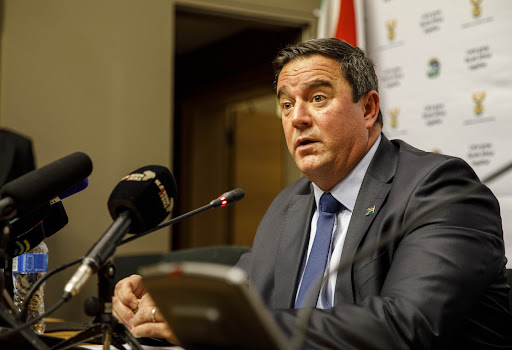As the sun dipped below the horizon in KwaZulu-Natal, a storm of allegations brewed, casting a shadow over the province’s law enforcement. The words of Lt-Gen Nhlanhla Mkhwanazi reverberated through the corridors of power, accusing senior officials, including Police Minister Senzo Mchunu, of meddling in ongoing police investigations. These claims sent shockwaves across the nation, sparking a firestorm of controversy and calls for urgent action.
In the midst of this maelstrom, Democratic Alliance leader, John Steenhuisen, emerged as a voice of reason and clarity. Speaking with conviction, he vouched for Mkhwanazi’s integrity, asserting that such serious allegations could not be dismissed lightly. “I’ve known Mkhwanazi for many years as a KZN resident and I’ve known him for his work there. I don’t think he’s someone who makes wild, unsubstantiated allegations,” Steenhuisen emphasized in an interview.
Steenhuisen’s call for a thorough investigation struck a chord with many South Africans grappling with the implications of these accusations. He urged for parliamentary scrutiny, emphasizing the need for Mkhwanazi to present his case before the nation’s lawmakers. The gravity of the situation was not lost on Steenhuisen, who drew parallels to past instances where swift action was taken to uphold accountability.
The rallying cry for justice echoed beyond party lines, with various political factions joining forces to demand accountability. The chorus grew louder, calling for the suspension of implicated officials to ensure a transparent and impartial inquiry. Amidst the tumult, President Ramaphosa’s commitment to upholding the rule of law and preserving the integrity of the security services reverberated through the political landscape.
In the face of vehement denials and counterclaims, the nation stood at a crossroads, questioning the guardians entrusted with upholding justice. The shadow of doubt loomed large, threatening to erode public trust and sow discord within the ranks of law enforcement. As the saga unfolded, the imperative of maintaining discipline and unity within the police force became paramount, underscoring the need for swift and decisive action.
The unfolding drama underscored the fragility of public confidence in the guardians of law and order. The specter of alleged collusion with criminal elements cast a pall over the esteemed institution of law enforcement, prompting soul-searching and calls for stringent oversight. As the nation grappled with these revelations, the imperative of transparency, accountability, and unwavering commitment to justice emerged as guiding beacons in turbulent times.
In the corridors of power and the streets of South Africa, a reckoning beckoned—a moment where the principles of integrity and accountability stood at a precipice. The echoes of Mkhwanazi’s allegations reverberated as a call to action, a plea for a system where the rule of law reigns supreme and justice is not a mere illusion. As the nation awaited the unfolding chapters of this saga, one thing remained clear—the imperative of upholding the trust of the people and safeguarding the pillars of democracy.

